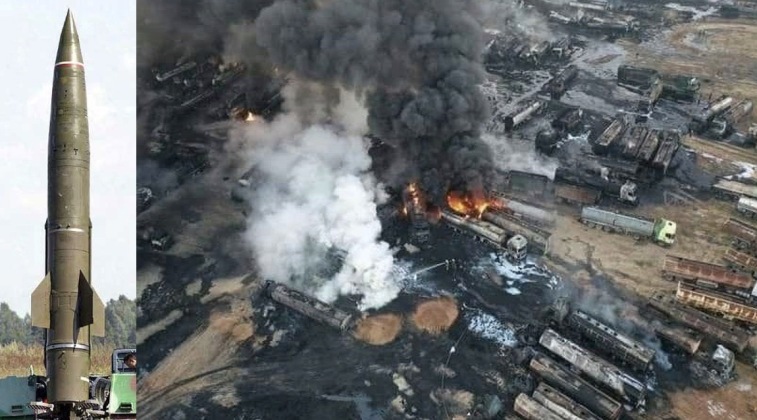Syria: Oil refinery attacks raise fears of ‘grave escalation’
Alleged Russian missile barrage destroyed 200 oil trucks that took 20 hours to bring blazes under control.
A spokesman for the Syrian National Army said 20 primitive oil refining facilities were lost costing millions of dollars [Courtesy: White Helmets]
By
Liz Cookman and
Husam Hezaber
11 Mar 2021
Attacks on rural Aleppo that caused severe damage to oil facilities have been described as “state terrorism” by the Syrian opposition, in what is a possible message to Turkish-backed forces in the region.
The deadly attacks last Friday, reportedly launched by Russia from warships and by forces aligned with the regime of Syrian President Bashar al-Assad,
hit makeshift oil refineries in al-Hamran near the town of Jarablus and the village of Tarhin near al-Bab in eastern Aleppo.
KEEP READING
‘What is this place?’ Syrians recall life and death in prison‘Constant fear’: Iraq and Syria face ISIL resurgenceSyria’s war transformed women’s roles through empowerment‘It’s not safe’: Report finds children want life away from Syria
The attack caused huge fires, especially in Tarhin, destroying more than 200 oil trucks and taking 20 hours to bring them under control, according to Syria’s volunteer civil defence, known as the White Helmets.
Stark aerial and satellite images showed the scale of the damage left behind with a large area of land charred and the monetary value of the losses thought to be millions of dollars.
A statement from the Syrian Opposition Coalition – an alliance of opposition groups – condemned the attack, saying cluster munitions had been used, which are banned under international law.
“These crimes cannot be justified whatsoever as they are of purely terrorist, treacherous nature,” the statement said, adding it marked a grave escalation.
Hasan Mohamad – director of the al-Bab division of the White Helmets – told Al Jazeera three Tochka ballistic missiles carrying cluster bombs were fired at al-Hamran, where there was a market for fuel, causing 300-metre-tall flames.
Less than an hour later, he said, improvised fuel refineries in Tarhin were hit with four missiles, a mix of Tochka and Uragan 9M27K-series surface-to-surface rockets, also carrying cluster munitions.
It took more than 100 volunteers and 50 vehicles, such as fire trucks, to try to bring the situation under control. White Helmets volunteer Ahmed al-Waki was killed while trying to put out flames when a fuel tank exploded.
The attack also caused some damage to civilian property and will deprive displaced families who rely on the refinery for work of a vital lifeline at a time when the Syrian currency has tumbled and
food insecurity is at its highest since the war began.
According to the United Nations, about four million people live in Aleppo and the northwestern province of Idlib, which is the country’s last rebel stronghold. About half have been displaced, many more than in previous years.
Bakeries, hospitals and other facilities may be cut off from their fuel supply as a result of the targeted strikes.
Oil installations in Turkish-controlled parts of Aleppo have come under repeated attack in recent months, although the Syrian regime and its Russian backers have not claimed responsibility.
Turkey’s state-owned Anadolu news agency said it was not clear who carried out the attacks on Friday, but the White Helmets, Syrian National Army (SNA) and the SOC blamed Russia.
White Helmet volunteer Ahmed al-Waki was killed trying to put out the fire [Courtesy: White Helmets]Major Yusef Hammoud, a spokesman for the SNA, a coalition of armed opposition groups that is backed by Turkey, said 20 primitive oil-refining facilities were lost, estimating a loss of millions of dollars.
“The main goal of the attacks is to weaken the economy of the region as the fuel that feeds [opposition-held] areas comes from the two targeted facilities – it is the backbone of the region’s economy,” he said.
A dispute over exporting fuel to al-Assad-held areas also played a part, with the mostly Kurdish Syrian Democratic Forces that is allied with the United States under instruction not to supply the regime, Hammoud said.
“Russia can’t bomb SDF areas due to US presence in the region, so it hit the oil tanks limiting the supply,” he said. Oil tanks are exported from SDF areas through Tarhin to the opposition-held northwest.
“The escalation, of course, disturbs Turkey. Turkish bases in the area responded by attempting to bomb the source of the missiles and striking al-Bab city the following day,” he said.
A ceasefire agreement between Turkey and Russia was agreed on on March 5, 2020, and it included a “de-escalation zone” stretching from the northeastern mountains of Latakia to the northwestern suburbs of Aleppo city.
According to the UK-based war monitor Syrian Observatory for Human Rights, 420 people have been killed in the zone since then.
Middle East security analyst Seth Frantzman said the attack was “unusual” and was likely meant to “send a message that Damascus and Moscow are monitoring closely the role of the Turkish-backed SNA in areas near Aleppo”.
The attack also caused damage to civilian property [Courtesy: White Helmets]“Using ballistic missiles to sow chaos and fires also shows that Turkey cannot protect the area that it occupies in northern Syria,” he said.
Syria’s northern neighbour Turkey has seized control of several regions inside Syria in military campaigns, mostly against Kurdish-held areas, since 2016. Since 2018, Russia and Turkey have sought to reduce tensions in northern Syria.
“From time to time Russia and the Syrian regime seek to show that they can continue to strike with impunity in areas that Turkey ostensibly controls. The message is that Turkey’s administration of these areas, running to four years of control in some places, will not last forever,” Frantzman said.
SOURCE : AL JAZEERA
About 200 oil trucks caught fire in missile attacks and it took 20 hours to bring blazes under control.

www.aljazeera.com











![A spokesman for the Syrian National Army said 20 primitive oil refining facilities were lost costing millions of dollars [Courtesy: White Helmets] A spokesman for the Syrian National Army said 20 primitive oil refining facilities were lost costing millions of dollars [Courtesy: White Helmets]](/proxy.php?image=https%3A%2F%2Fwww.aljazeera.com%2Fwp-content%2Fuploads%2F2021%2F03%2F%25D9%2586%25D8%25B3%25D8%25AE%25D8%25A9-%25D9%2585%25D9%2586-IMG_5360.jpg&hash=4153552d6a7b3ab210a19a6b99391b46)



